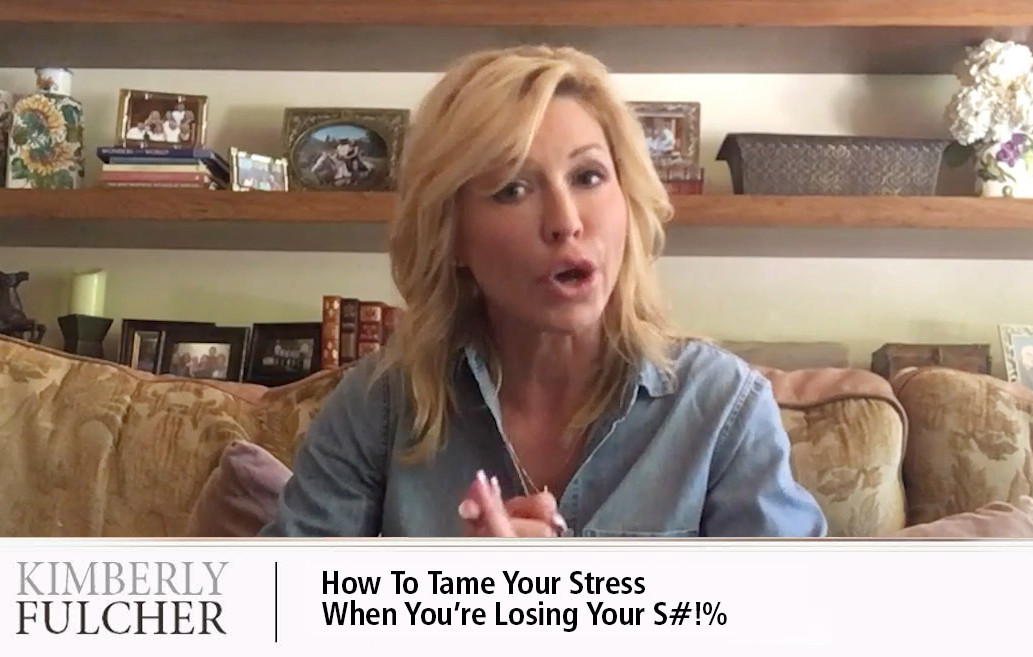I could feel my irritation escalating.
I was on hold with the utility company.
I was also behind on an important deadline, and I had work to do. My Internet connection had just stopped working for the third time that day. It was a chronic problem, and I was out of patience.
I didn’t have time for this. I was juggling multiple projects, back-to-back meetings, weekly travel, and 300 emails a day. (And that was just my job.) I wasn’t stressed. I was a stress ball.
And then it happened.
The operator came back onto the line, and told me I’d need to be transferred to another department. I was three transfers and twenty minutes into the call already. It was the last straw.
I LOST MY SHIT.
It was ugly, and I was not nice – or polite or professional or any other appropriate descriptor. I was a raving maniac, and when I hung up all I’d accomplished was yelling at some poor customer service agent.
You’ve been there, right? You’re juggling so many balls you feel as if you’ll lose your mind. Push comes to shove, your very own final straw shows up, and you tumble over the edge.
I’ve been working as a life coach focused on women’s empowerment for more than a decade, and all of my clients have had to handle stress in their lives. (As the story I just shared indicates, I’ve also had plenty of chances to deal with my own).
Happily, I’ve developed quite a toolkit of stress busting strategies. In this week’s video coaching session I’m going to share three of my favorite methods. Let’s tame that stress monster. (Press PLAY already. Save a customer service agent.) ☺
Step 1: Goldilocks your stress.
You may have been taught that having any stress at all is bad. That’s actually not true. You don’t want an absence of stress in your life. You want a balance of it. As it turns out, some stress is actually a good thing.
One of my favorite tools is the Gorski-CENAPS stress thermometer. It illustrates the effects of stress on the body using a scale of 0-10.
- If you’re at 0-3 you’re relaxed (or sleeping).
- At 4-6 you’re in what’s called functional stress. There’s pressure, but it’s resulting in performance.
- At 7-9 you’ve moved from productivity to a stress reaction. You’re less effective and your physiology is impacted.
- At level 10 you short circuit. (Okay, it’s officially called trauma reaction, but you get my point).
What level are you living at? It is too hot, too cold, or just right? Just right is your personal Goldilocks. You need to arrive at your own formula. You can flesh it out by paying attention to your life. How are you feeling, and what’s contributing to how you’re feeling when you’re in each of these zones?
It’s important to commit time to relaxation every day, so you want to hang out a bit in the 0-3 category. (This is in addition to sleeping). You need to recharge and replenish. When you’re body is rested and your mind is clear you’re better able to handle whatever comes your way.
Your sweet spot is the second level (4-6). This is where you want to spend the majority of your time. In this neighborhood you have some pressure, but it’s working for you. You’re productive. You’re moving the ball down the field. This is where you build beautiful things like families and careers and companies.
Finally, if you’re logging hours in the 7+ zone, you’re in dangerous territory. Operating at full throttle for an extended period of time will make you sick, and you’ll be a nightmare to be around. While I realize that completely eliminating time here isn’t all that realistic, you want to minimize it. This is the “only occasionally” zone.
What about the short circuit zone? They call it trauma reaction for a reason. This is a no go. It costs too much. Learn to stop yourself before you get there. Use the scale.
Thanks Goldilocks. Next…
Step 2: Cope on purpose.
You need a list of go-to strategies to blow off steam, and you need to use at least one of them every day. Stress is energy. What you take in, must eventually be released. Coping mechanisms help you release.
You might be surprised to realize that you’re already good at coping mechanisms. You use them every day. The trouble is, unless you consciously developed your current favorites, you may have defaulted to some not so empowering fallbacks.
Maybe you lose your cool and snap at people. You have a drink. You smoke. You take a pill. You eat. You shop. You work. You control. You create drama. You do some outrageous thing to get attention, or you go on the hunt for your next romantic thrill.
In their purest form, most disempowering coping mechanisms are addictive in nature. You don’t have to be an addict for these types of behaviors to disrupt your life. In fact, many people unconsciously lean on addictive crutches to manage stress.
The solution here is straightforward. You want to identify your disempowering coping strategies and replace them with empowering ones. Tell the truth. How are you numbing out and letting go of stress? Is it working? Does it empower you? If so, keep it. If not, replace it.
Empowering coping strategies are available to everyone. You don’t need a lot of time or money to take advantage of them. Focus on three types of activity.
- Do anything physical. Walk, run, stretch, yoga, spin, swim, hike or play your favorite sport. Bonus points if you sweat.
- Enjoy anything quiet. Double bonus points if it involves focus on your breath. Think early morning coffee, journaling, meditation, hot baths, soft music, prayer, or being in nature.
- Create. Think cooking, gardening, crafting, knitting, or art. (They make adult coloring books now, which are the bomb.)
Cope on purpose. Every day. You do have time. It’s important..
On with the stress taming…
Step 3: Stop doing stress that doesn’t matter.
There are two kinds of stress. Stress that matters and stress that doesn’t.
Stress experienced in the service of what you want matters.
It’s okay to stretch yourself. In fact, you must. You’re going to feel stress when you do new, big, important things. (Think getting married, having kids, buying a house, changing jobs, getting promoted, starting a new project, or saying no when you need to).
Stress related to anything you’re tolerating (no matter why you’re tolerating it) does not matter.

When you tolerate things you create your own stress. #GetYourGrooveBack
Tweet this!
You do it every time you fail to handle your business.
- If you hold your breath every time you use your credit card (hoping it won’t be declined because you haven’t handled your financial business) you’re tolerating.
- If you say a little prayer before you start your car every morning (because you haven’t handled getting it repaired) you’re dealing with a toleration.
- Every time you look at that spot on the carpet you haven’t cleaned, the light bulb you haven’t replaced, the pile of mail you haven’t opened, or that lamp you hate but haven’t gotten rid of, you are tolerating.
- You know that morning routine where you can’t find your keys because you’re always randomly setting them down, nothing fits because you haven’t cleaned out your closet in years, and there’s nothing to eat because you haven’t shopped? Yep – tolerations everywhere.
You need to save your energy for stress that matters.
That means you need to stop it with the tolerations already. Deal with your financial issues. Figure out your car situation. Change the light bulb. Put your keys in one place. Open your mail. In short, handle your business.
It will be annoying and boring and possibly uncomfortable. And you need to do it anyway. Require more of and for yourself. You have mad skills and superhero strengths. Use them.
If all of this stress talk has opened your eyes to a change you need to make, know that you can change anything in your life. Check out 3 steps to change anything for some extra advice.
That’s it for the week. Check into your stress level, cope on purpose, and reserve your stress for the good stuff.
Let me know how these strategies work for you by commenting below. I love hearing from you!
If you’re not part of my community yet, sign up to get your free weekly coaching.
Share this week’s coaching with a friend (or 5). We all need encouragement and support. ☺
You Got This!
KIM
Important PS – If you’re reading this and you think you might have an addiction, please seek help. We need you whole and healthy. Check out AA, hire a therapist, or reach out to someone you trust. Addiction is a medical disease that can be treated. There is no shame in having the condition. The only shame is in what the world will miss out on if you don’t get well. Sending you big love.




